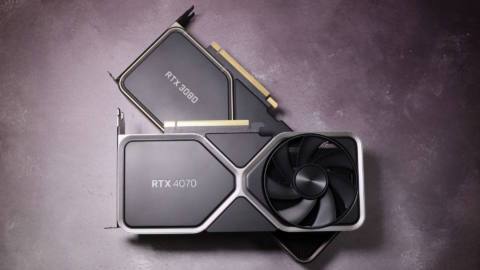It's that time of the month again, when Valve publishes statistics for its latest hardware survey. All the key details about the different gaming PCs sampled are there for viewing and while the figures for March don't contain anything hugely significant, the long term trends show that PC gamers upgrading from older GPUs are mostly switching to Nvidia's latest RTX 40-series of graphics cards.
Not that this is in the least bit surprising, of course, as Nvidia has dominated Valve's GPU charts for a long time. But anyone hoping that AMD's RX 7000-series would make some headway in the survey will be disappointed, as the latest RDNA 3-powered chips have only improved by a tiny 0.1% of the survey share, matching the four years old RDNA 1 at 0.4% overall.
AMD's last generation of chips is still at 3.1% and a reasonable slice of that is the GPU in the OLED-version Steam Deck. Labelled as 'AMD Custom GPU 0405', that chip holds 0.67% of the total GPU share in the survey. While that might not look like much, it's AMD's fourth highest entry in Valve's GPU listing, with the Radeon RX 580 and a bunch of integrated GPUs coming ahead of the Steam Deck.
As for Nvidia, well it's graphics cards form a smidge under 72% of the total survey, with the GeForce RTX 30-series forming the largest part of this at 27.8%. The older GTX 10-series and RTX 20 and 16-series of cards have been slowly decreasing in the figures, and it's been the latest Ada Lovelace products that have filled those places.
Continuing with the theme of 'gee, no surprise there', it's the mainstream and budget products that were the most common in the sample. The GeForce RTX 3060 takes the top slot, with 6.71%, followed by its predecessor, the RTX 2060, with 3.98%. The most common 40-series cards are the RTX 4060 and RTX 4070, at 2.5% and 2.42% respectively.
If you think that means there are no mega-bucks cards near the top of the list, then think again. The wallet-conquering RTX 4090 is 30th and the RTX 4080 is only two positions lower.
As always, though, these figures can't quite be taken at face value, as without any information about the surveying method (e.g. sample size or geographic distribution), there's no way of telling just how representative Valve's survey is for PC gaming as a whole.
That said, the industry doesn't completely ignore it, and will use the figures alongside other company data to determine what the potential user base for a game will be running with.
Beyond graphics chips, six-core CPUs form 34.8% of the survey share, with 8-core processors at 19.8%. Interestingly, CPUs with ten cores are at 5.62%, closely followed by 12, 14, and 16 core chips, showing that no small number of PC gamers sampled are using one of AMD or Intel's latest CPUs.

Best CPU for gaming: The top chips from Intel and AMD.
Best gaming motherboard: The right boards.
Best graphics card: Your perfect pixel-pusher awaits.
Best SSD for gaming: Get into the game ahead of the rest.
As for system RAM, almost half of the survey respondents had 16GB in their PCs, but 32GB systems increased from last month by 2% to reach 29.3%. Give it another year and I bet this figure will be a lot closer to the 16GB figure, as more big games start to require the larger amount of RAM.
And it's a similar picture with monitors, with 1080p panels taking the lion's share at 58% and 1440p at just under 20%. 4K remains at around 3.4% and doesn't show much sign of changing.
The one thing to note in the March figures is that the most common OS language used is Simplified Chinese, at 33.4%, whereas English is at 32.5%—the former has been consistently increasing in share over the last few surveys, and this can be attributed to the fact that there's only been a China-only version of Steam for a few years.
As the months roll on, I suspect that Chinese will be the number one language permanently, given the sheer number of PC gamers in that country.






